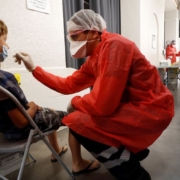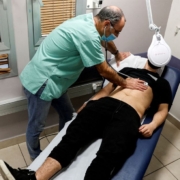A chain of events possibly triggered by unrecognized infection with the SARS-CoV-2 coronavirus could be causing the mysterious cases of severe hepatitis reported in hundreds of young children around the world, researchers suggest.
For years, researchers have been moving towards decentralized clinical trials (DCTs), and in a matter of months, COVID-19 changed the trajectory. Clinical operations teams and investigator sites around the world rose to the challenge and worked quickly to deploy new tactics to serve their study participants. The resulting reward is that DCTs, which can be leveraged smartly to reduce participant burden and improve recruitment and retention, are now becoming more widely adopted in design considerations. But rewards bring about new risks and challenges, and DCTs create new concerns for monitoring participant safety. Dario Lirio – Senior Director, LifeSphere Clinical at ArisGlobal – analyzes the risks and rewards of DCTs.
Using Assessment Tools to Determine the Validity of Non-Randomized Studies
Analysis, Body Mass Index (BMI), Clinical Trials, Diabetes, FDA/Regulatory, IQVIA, National Institute for Health and Care Excellence (NICE), Nonrandomized studies (NRS), Patients, R&D, Randomized Controlled Trials (RCTs), Real world evidence, ResearchersAs real world evidence (RWE) becomes a more prevalent resource for confirming and expanding product benefit-risk profiles, non-randomized studies (NRS) are emerging as a valuable generator of real world data (RWD). Joan Largent – Senior Director, Epidemiology and Outcomes Research at IQVIA – discusses the findings of her recent study and how researchers can utilize assessment tools for their ability to accurately assess NRS validity.
COVID-19 was the third leading cause of death in the United States for the second year in a row in 2021, with death rates rising for most age groups, a government study showed on April 22.
Scientists on March 31 published the first complete human genome, filling in gaps remaining after previous efforts while offering new promise in the search for clues regarding disease-causing mutations and genetic variation among the world’s 7.9 billion people.
Pfizer Boss Earned $24.3 Million in 2021 and Other COVID-19 News
AstraZeneca, Business, Coronavirus Disease (COVID-19) Pandemic, COVID-19 cases, COVID-19 Vaccinations, Dr. Anthony Fauci (Director), Hospitalized COVID-19 Patients, JAMA, Johns Hopkins University School of Medicine, Omicron BA.2, Pfizer, R&D, Researchers, Salaries, TinnitusPfizer CEO Albert Bourla raked in $24.3 million in total compensation in 2021. In other news, tinnitus (ringing or buzzing in one or both ears) might be a side effect of COVID-19 vaccines.
A quarter of symptomatic kids hit by long COVID; mRNA shots provide best protection in breast milk
Asia, Australia, Babies, Children, Covid-19 Data, COVID-19 Studies, COVID-19 Vaccinations, Europe, JAMA Pediatrics, Kids, Long COVID, Messenger RNA (mRNA) Vaccines, mRNA-1273/Moderna COVID-19 Vaccine (Moderna), Omicron (B.1.1.529) (South Africa), Pfizer, Researchers, South America, Surfaces, WomenOne in four children with COVID-19 symptoms develop “long COVID,” according to data pooled from 21 earlier studies conducted in Europe, Asia, Australia and South America. Also, according to a study reported on March 14 in JAMA Pediatrics, women who wish to pass protective antibodies induced by COVID-19 vaccines to their babies via breast milk should opt for the mRNA shots from Moderna or Pfizer/BioNTech.
GeoVax vaccine targeting virus in two places shows promise; virus may become resistant to antibody drugs
Antibody Studies, BNT162b2 (Pfizer and BioNTech), Cell, Clinical Trials, COVID-19 Studies, Delta Variant (B.1.617.2; India), Genetics, GlaxoSmithKline, Immunosuppression, Janssen COVID-19 Vaccine (J&J), Medical Journals, mRNA-1273/Moderna COVID-19 Vaccine (Moderna), Mutations, New England Journal of Medicine, Omicron (B.1.1.529) (South Africa), R&D, Researchers, SARS-CoV-2 spike protein, The Lancet, The Lancet Microbe, Vir BiotechnologyAn experimental vaccine developed by GeoVax Labs Inc. succeeded in promoting development of antibodies that target two different sites on the virus in a small pilot study and was advanced to mid-stage clinical trials, researchers reported.
COVID-19 patients who receive one of the few antibody treatments that works against the Omicron variant must be carefully monitored because after the drug is infused, the virus may mutate and become resistant to it, researchers warned after seeing such cases with Delta variant patients.
As the health industry rapidly shifts to more patient-centric approaches to care and clinical research, technology is just as quickly becoming the cornerstone to effectively engage clinical study participants. Electronic clinical outcome assessments (eCOAs) are essential to ensuring that each clinical trial is optimized for the patient’s experience by being faster, more on-demand, and more customizable. Kris Gustafson – Vice President and Global Head IQVIA eCOA, IQVIA – discusses three key reasons to implement an eCOA strategy for clinical trials.
An Oxford University study has found that COVID-19 can cause the brain to shrink, reduce grey matter in the regions that control emotion and memory, and damage areas that control the sense of smell.










